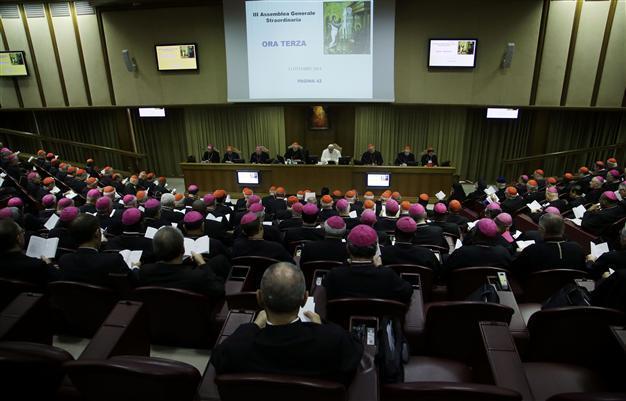Catholic bishops say gays have gifts to offer church
VATICAN CITY - The Associated Press

Bishops and Cardinals attend a morning session of a two-week synod on family issues at the Vatican, Monday, Oct. 13, 2014. AP Photo
Catholic bishops are showing unprecedented openness to accepting the real lives of many Catholics today, saying gays have gifts to offer the church and should be accepted and that there are "positive" aspects to a couple living together without being married.A two-week meeting of bishops on family issues arrived at its halfway point Monday with a document summarizing the closed-door debate so far. No decisions were announced, but the tone of the preliminary document was one of almost-revolutionary acceptance, rather than condemnation, with the aim of guiding Catholics toward the ideal of a lasting marriage.
The bishops said gays had "gifts and qualities" to offer and asked rhetorically if the church was ready to provide them a welcoming place, "accepting and valuing their sexual orientation without compromising Catholic doctrine on the family and matrimony."
For a 2,000-year-old institution that believes gay sex is "intrinsically disordered," even posing the question is significant.
"This is a stunning change in the way the Catholic church speaks of gay people," said the Rev. James Martin, a Jesuit author. "The Synod is clearly listening to the complex, real-life experiences of Catholics around the world, and seeking to address them with mercy, as Jesus did."
The bishops repeated that gay marriage was off the table. But it acknowledged that gay partnerships had merit.
"Without denying the moral problems connected to homosexual unions, it has to be noted that there are cases in which mutual aid to the point of sacrifice constitutes a precious support in the life of the partners," they said.
For heterosexuals, the bishops said they must grasp the "positive reality of civil weddings" and even cohabitation, with the aim of helping the couple commit eventually to a church wedding.
The bishops also called for a re-reading of the 1968 encyclical Humanae Vitae that outlined the church's opposition to artificial birth control. The bishops said couples should be unconditionally open to having children, but that the message of Humanae Vitae "underlines the need to respect the dignity of the person in the moral evaluation of the methods of birth control."
There has been much talk inside the synod about applying the theological concept of the "law of gradualness" in difficult family situations. The concept encourages the faithful to take one step at a time in the search for holiness.
Applying the concept to matters of birth control would be an acknowledgement that most Catholics already use artificial contraception in violation of church teaching. But it would encourage pastors to meet them where they are, and then help them come to understand the full reasoning behind the ban.
Bishops also called for "courageous" new ways to minister to families, especially those "damaged" by divorce. The document didn't take sides in the most divisive issue at the synod, whether Catholics who divorce and remarry without an annulment can receive Communion.
The document said these Catholics deserve respect and should not be discriminated against, and then laid out the positions of both sides: those who want to maintain the status quo barring them from the sacraments, and those who favor a case-by-case approach, in which the couple undertake a path of penance.
Pope Francis has called for a more merciful approach to these couples, but conservatives have insisted there is no getting around Jesus' words that marriage is indissoluble.
















